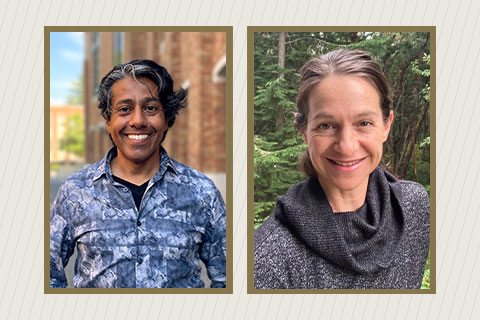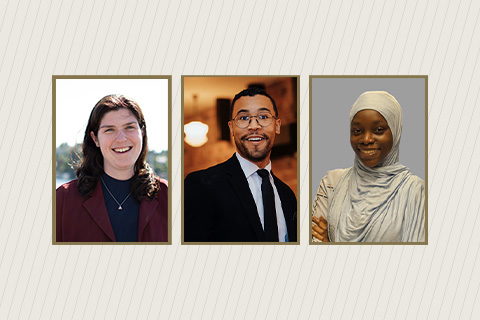Amy Sprague
December 18, 2023
A&A adapts a workshop model to strengthen engineering student applications for fellowships and create community.
A&A assistant professor Ed Habtour had a lot of questions for Lauren Kuehne, a then-research scientist in UW’s School of Aquatic and Fishery Sciences. They had connected over military aircraft noise. Kuehne approached the topic from its effect on people and wildlife and Habtour from using novel structural designs for reducing noise in aerial and ground vehicles. They later collaborated on a paper outlining a technology-forcing framework for noise pollution reduction.

Ed Habtour and Lauren Kuehne
But it was Kuehne’s experience with developing an inclusive and collaborative graduate workshop that had Habtour thinking of another collaboration – this time around preparing students to submit competitive fellowship proposals. When A&A created a competitive faculty awards process last spring to grant funding to initiatives that advance the department’s strategic plan, Habtour was ready to submit the workshop proposal modeled on Kuehne and colleagues' model at Fisheries. And he enlisted her to help him.
“The challenge of translating scientific knowledge into practical applications is a constant struggle. In fisheries, this collaborative workshop model has been consistently positive. I was eager to try it in another UW department. It has been a reliable model in fisheries, but I hadn’t innovated on it in a while,” said Kuehne.
The workshop’s model
The inclusive workshop model incorporated a strong foundation for a supportive and equitable environment through providing diverse mentorship through peers, faculty members, and scientists in national laboratories, and encouraging cross-pollination of disciplines. Habtour recruited students and faculty mentors across the College of Engineering and built the workshop specifically around submitting a National Science Foundation Graduate Research Fellowships Program (NSF GRFP) application, although the students could use their efforts for many competitive fellowships and scholarships.
Several UW engineering students who received NSF GRFP or similar fellowships in recent years generously gave their time to meet with mentees throughout the workshop to give advice and review application materials. Habtour also sought external scientists at national and defense laboratories as mentors who received similar fellowships. The intentional mixing of internal and external mentors was to help students think about how to translate basic scientific knowledge into practical engineering applications. The 25 participating students from undergraduate through the doctoral level were slotted into assigned “mentor and peer” groups. Each group included one or two mentors and two to three students.
Kuehne explained, “There was a lot of cross-pollination of disciplines, but it worked out beautifully because NSF reviewers are rarely in your discipline. It’s important to communicate your concepts clearly to those who might speak a different engineering language. Doing this at the College level versus the department level really worked to get those outside perspectives.”
A supportive, equitable and inclusive environment
I learned it’s okay to be vulnerable with great mentors and it would translate to more students finding their true career aim.”
Participating students appreciated the support of the community. Kylie Gallagher, a bioengineering PhD student, said, “This workshop created a very positive and encouraging community. It’s easy to think that there should be a sense of competitiveness as everyone is applying for the same fellowship. But it never felt that way. Everyone wanted to help each other have the best application and understood how stressful it could be to be applying during the quarter when you also have classes and research going on.”
Several students really appreciated the value of the interactions. Arafat Fasuyi, also a bioengineering PhD student, would recommend this workshop particularly to incoming students who haven’t created their own network yet and for students writing their first fellowship applications who don’t know how to start. And A&A PhD student Morris Richardson commented, “I learned it’s okay to be vulnerable with great mentors and it would translate to more students finding their true career aim.”

Kylie Gallagher, Morris Richardson and Arafat Fasuyi
Kuehne stressed that the workshop’s design is intended to support equity and inclusion by equalizing access to mentorship and fostering a sense of support for participants at all stages of their academic journeys. In her experience, a key advantage of this model is creating a network of advisors who can provide guidance, not only in enhancing applications but also in facilitating a comfortable atmosphere for receiving constructive criticism and engaging in collaborative research. “I can’t emphasize enough the crucial role the mentors play for the workshop's success,” she said.
And, for Habtour, it worked. He said, “In this workshop, we witnessed the power of collaboration and inclusivity in unlocking the full potential of our students. By providing a supportive and equitable environment, we are shaping the next generation of scholars who will make a lasting impact as engineers."